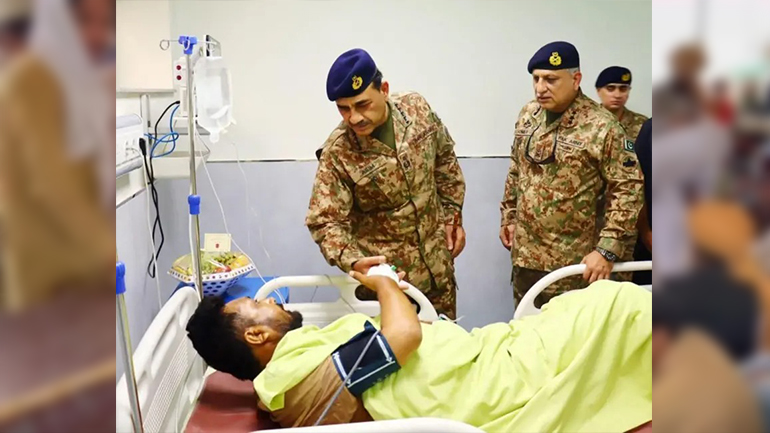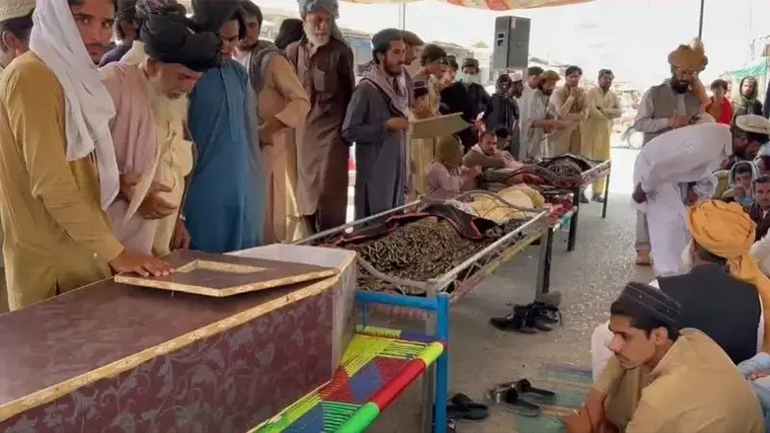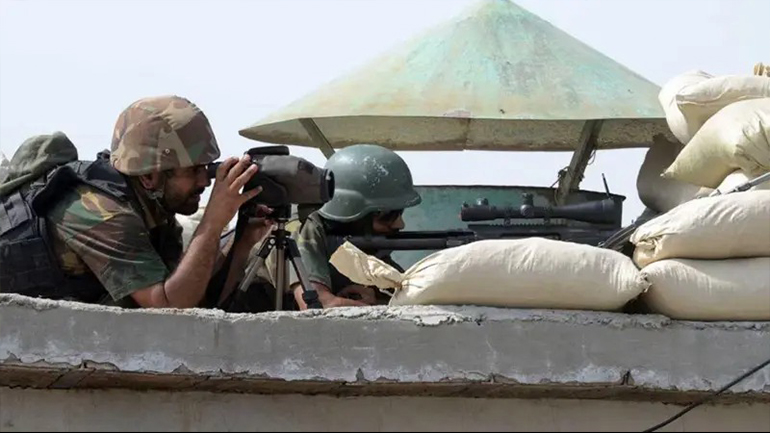

The situation remains tense two days after a suicide attack on security forces in North Waziristan, a former tribal region of Pakistan. On Monday, roads were deserted following a curfew, and Section 144 was imposed to restrict the movement of security forces in the area affected by the attack. The incident took place on June 28 in Mir Ali, a town in the North Waziristan district of Khyber Pakhtunkhwa province, and is considered one of the most significant attacks in recent times. According to Pakistan’s military media wing, the Inter-Services Public Relations (ISPR), a vehicle laden with explosives rammed into a convoy of security forces on Saturday, killing 13 personnel. ISPR also reported that 14 militants were killed in retaliatory action. Pakistan blamed “Indian-sponsored” militants for the attack, a claim that was denied by India’s Ministry of External Affairs. The banned militant group Aswad al-Harb, linked to the Hafiz Gul Bahadur network, claimed responsibility for the suicide bombing in Mir Ali.
In the southern districts of Khyber Pakhtunkhwa, clashes between security forces and armed militants have once again intensified to a dangerous level. Among the most affected areas are the tribal districts of North Waziristan, Upper South Waziristan, and Lower South Waziristan, along with urban centers like Lakki Marwat, Tank, and Kulachi, where a sharp rise in terrorist attacks, abductions, and violence has been reported. On June 28, in North Waziristan’s Ghulam Khan area, militants attacked a security convoy, injuring six personnel, according to local police reports. In response to the growing militancy and terrorism, the Ghulam Khan border crossing with Afghanistan was sealed for all traffic, halting cross-border trade. The Deputy Commissioner of North Waziristan later issued three separate notifications, imposing a nighttime curfew and Section 144 restrictions on Monday to control the situation. Tribal elder and Utmanzai tribe spokesperson Maulana Baitullah expressed concern over the worsening situation, stating that local civilians are heavily impacted by the continued clashes between insurgents and security forces. “This is not new—it has been ongoing for years and shows no signs of ending,” he said. A resident described the situation as resembling a guerrilla war, with frequent ambushes and attacks from both sides, resulting in heavy civilian casualties.

On Saturday, Field Marshal Asim Munir visited the injured officer in Bannu.
On May 19, a quadcopter drone dropped explosives on a house, killing four children. A similar drone attack was later reported targeting children playing cricket in the same area. Following the drone strike in Mir Ali’s Hormuz area, locals staged a protest for nearly a week by placing the victims' bodies on the road. The protest ended after official assurances of steps to restore peace. Ehsanullah Tipu Mehsud, a senior journalist from South Waziristan, wrote on his X account that the region is “rapidly returning to the turbulent days of Operation Zarb-e-Azb and Rah-e-Nijat.” He warned that the resurgence of Taliban militants might push the state toward a new military operation in tribal areas. He added that tension is widespread across southern KP, where Taliban fighters are seen in public places, bazaars, and checkpoints. Although the government has not officially acknowledged Taliban presence, social media videos show armed men conducting searches and asserting control on roads, though these videos have not been independently verified. Security analyst Farzana Ali remarked that the use of VBIEDs (Vehicle-Borne Improvised Explosive Devices) and quadcopters in recent attacks has created an “extremely alarming” security situation. She noted that militants are successfully using modern warfare tactics to strike security convoys and official installations, saying, “The militant insurgency in Khyber Pakhtunkhwa is reaching a critical point.” have happened."

A sit-in was held in Mir Ali against the killing of four children in an alleged drone attack.
On May 25, a suicide attack occurred in North Waziristan, resulting in the deaths of 13 security personnel. In response, security forces claimed to have killed 14 militants. On June 25, in the Ghulam Khan tehsil, six personnel were injured in a blast targeting a convoy of security forces. Local sources confirmed the incident, though ISPR (Inter-Services Public Relations) did not issue any statement. Similarly, on June 29, an IED attack targeted a security vehicle in the Wanda Simo area of Lakki Marwat during a search operation. Police confirmed the incident on condition of anonymity. Two personnel were killed and three were injured, but the ISPR did not release any statement. On June 27, another attack occurred in Lakki Marwat at Kachi Qamar, where a quadcopter dropped a locally-made bomb, injuring 14 people, including children. Local police stated that there was intel about three armed militants hiding in a mosque in the area. The operation was intended to target them, but they managed to escape while civilians were injured. In the district of Tank, a police officer was killed, and last week, government employees traveling from Dera Ismail Khan to Tank were kidnapped, though they were later recovered. On June 30, militants attacked a security checkpoint near the town of Ladha in Upper South Waziristan. In retaliation, security forces returned fire, but a shell hit a nearby house, killing a woman. Amanullah, Chairman of the local bodies in Ladha, said that such incidents have become "a daily routine." He mentioned that the local tribes are planning a joint strategy and that a tribal gathering is scheduled for July 10 in Makeen to reach a collective decision. The violence is not limited to southern districts. In Mardan's Katlang tehsil, four people, including members of the peace militia, were abducted on June 20 in Babuzai. Their bodies were discovered two days later, on June 22. Currently, the banned militant group Tehrik-i-Taliban Pakistan (TTP) is very active in Khyber Pakhtunkhwa and frequently shares details of its so-called "Al-Khandaq" operation, which it launched a few months ago and has claimed responsibility for several attacks. In addition, the Hafiz Gul Bahadur faction of the Taliban is also increasingly active, along with its smaller splinter groups, such as Aswad al-Harb.

There are also reports of an alliance of three militant groups operating in Khyber and the southern districts. Senior journalist and analyst Ehsanullah Tipu Mehsud reported that this alliance includes Lashkar-e-Islam, Tehrik-e-Inqilab Islami, and Ittihad al-Mujahideen Pakistan — all of which have claimed responsibility for various incidents. According to Ehsanullah Tipu Mehsud, these groups are trying to create a rift between the local population and the security forces. He stated that militants have been somewhat successful in doing so, as there is a growing lack of trust in the government in areas experiencing heightened tensions. Some analysts argue that the government and security forces are currently relying on reactive counter-terrorism measures, only responding after an attack occurs. They suggest a more proactive policy is needed to prevent attacks before they happen. Journalist Farzana Ali commented that the current atmosphere in these regions is one of uncertainty and fear. "It seems the government is considering another military operation," she said. She added that previous operations like Zarb-e-Azb and Rah-e-Nijat had eliminated militants, but now they have once again established hideouts and are carrying out frequent attacks. In addition to North and South Waziristan, drone-like quadcopters appear to have been used in Lakki Marwat. Ehsanullah Tipu Mehsud clarified that these are not the same drones used by the United States, which had precise targeting capabilities. "The drones currently being used in Pakistan are essentially camera-equipped quadcopters rigged with homemade bombs. They often miss their intended targets," he explained. Analysts point out that despite fencing along the Pakistan-Afghanistan border, militants continue to cross easily. Preventing these infiltrations is now seen as a critical need.
Powered by Froala Editor